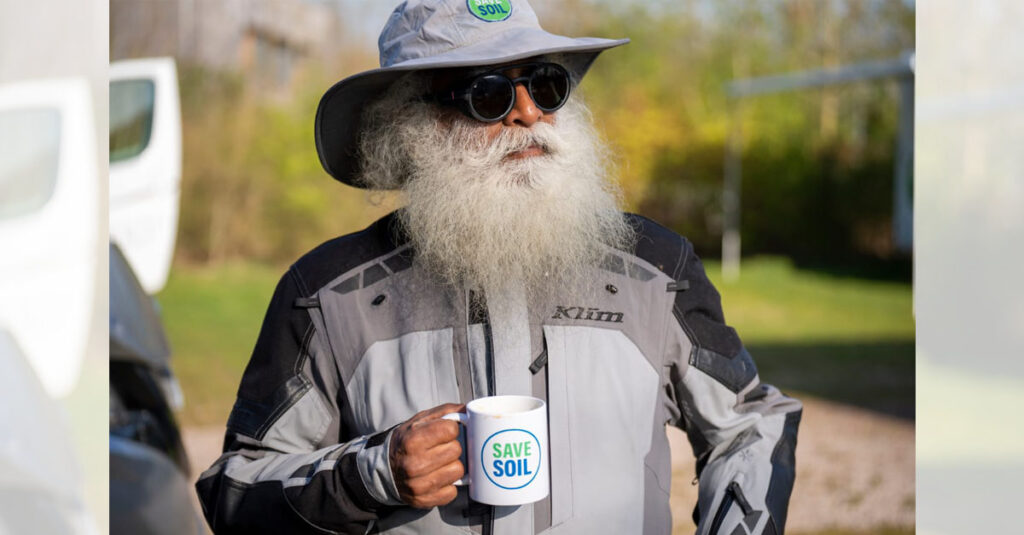
Sadhguru will be in Oman on May 25 as part of one of the largest ecological movements of our time.
A major crisis is looming over the world. Scientific evidence reveals that the planet would run out of soil in 45 to 60 years. If that happens, there will be a serious food crisis on the planet – it is inevitable. What we are facing now is soil extinction. The time has come where we need to address soil and take corrective measures now. These are not our words, but that of the one and only Sadhguru (*) Jaggi Vasudev, author and founder of the Isha Foundation.
Will need 200 years to repair the damage
“If we start now, in 15 to 25 years, there will be a significant turnaround. But if we wait for another 25 to 50 years and then try to turn it around, it may take up to 200 years to turn it around. And that period is going to be disastrous for human beings as a species,” Sadhguru warns in this exclusive interview with Black & White.
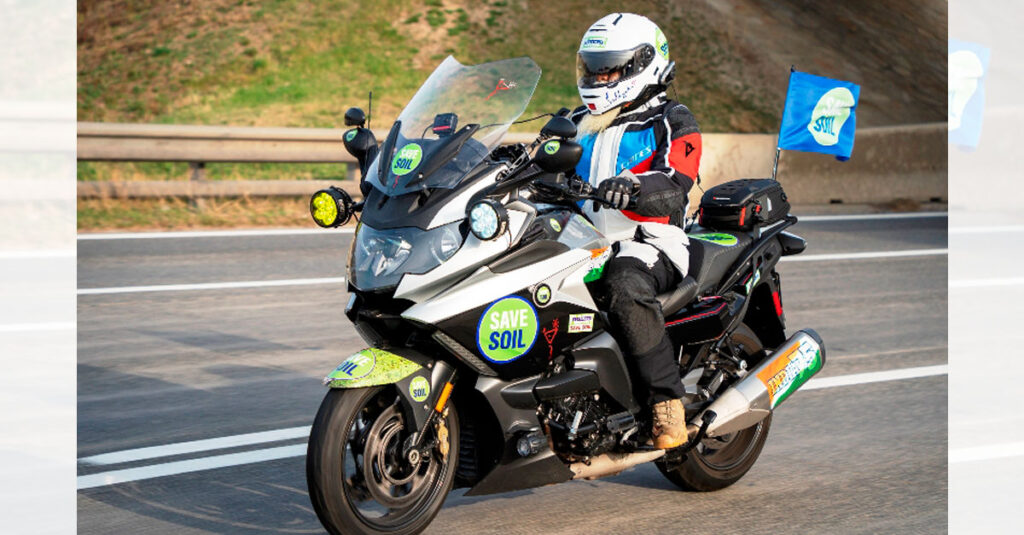
Largest ecological movement
Sadhguru, who is currently on a 100-day, 30,000km lone journey as part of the Movement to Save Soil, which is considered to be one of the ‘largest ecological movements of our time’, will be passing through Oman before this month end.
Save the Soil event on May 25
A Save the Soil event with Sadhguru is on the cards, reportedly on May 25, at the Oman Convention and Exhibition Centre, which is being organised in association with the Indian embassy in Oman.(For more details contact 98924655 or mail to [email protected])
Mission possible
Sadhguru, who is seen as a spiritual leader, author and philanthropist, is risking his life at 60 plus years to show and tell the world that he means business as he rides daily on a highly demanding journey in a ‘mission-possible’ to pull this planet back from the brink of disaster.
Being human is super
He is riding nearly 500kms on and average and sometimes on roads that are very bad. “My motorcycle is good for highways, but it is not built for rough roads – it is like bouncing around, literally getting my arms out of my shoulders,” he said noting how he took 18 hours to reach Istanbul from Bucharest. “Every day is ending at 1.30–2am (in the morning). I do not know how the day goes by. It feels like 10 minutes and the day is over. “Everyone thinks, ‘Oh, he’s superhuman!’ No, this is not about being superhuman. I want everybody to realise that being human is super!”
Fall in love with Mother Earth
Known in many circles as the man with not just an ever-ready smile but with the ability to laugh at both the posers and barbs that are thrown at him, Sadhguru is always in his element and perhaps in bliss even amidst such dangers that he is currently confronting on the road. He has an answer for everything, well almost everything, and here he notes simply why he is doing this: “If you have love for life around you, everything that you do, how much ever you do, you always feel you have not done enough. Right now, a time has come, where there is a lot of talk about doing things for the planet. Some people think it is their mission; some are doing it because there is an impending disaster. But the best way to act for the wellbeing of the planet is to fall in love with all that is the very source of our life – the soil, the water, and every other life which is striving to keep us alive,” he explained. “When you are in love, you are relentless action. That is what is needed right now. May you learn to love the mother of all mothers, Mother Earth,” he added.
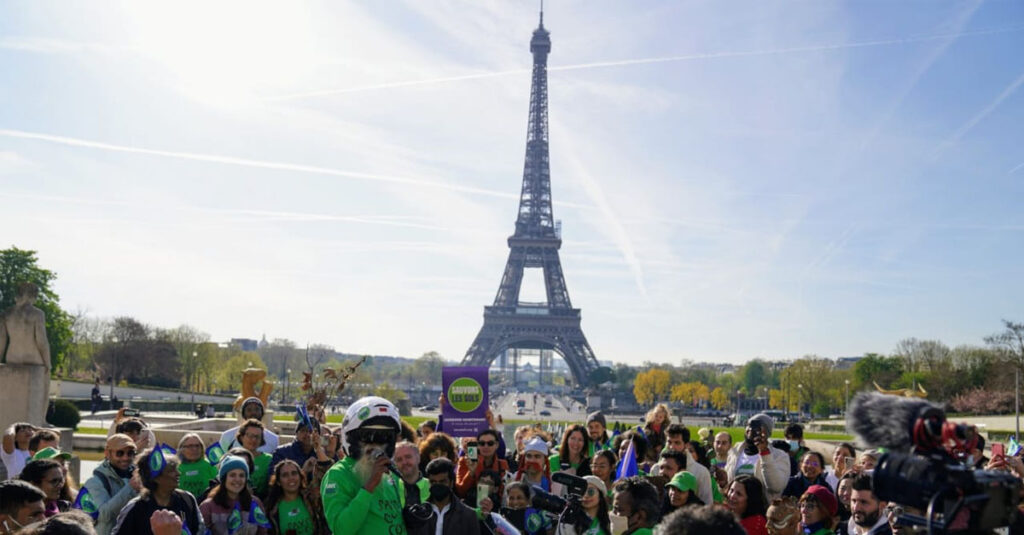
Change the narrative
The first thing that they want to change is the “narrative in the world towards soil”. “We must recognise soil as a living entity, not a bunch of chemicals – which has been a predominant misconception. It is not about nitrogen or phosphorus – it is about living soil. Agricultural soil must have a minimum of three (3) to six (6) percent organic content,” Sadhguru said, adding that as part of their ‘Conscious Planet – Save Soil’ movement, which is an effort to bring in a policy change and they have written to all the heads of state of 192 countries, and 730 political parties, to bring in a policy that a minimum of three to six percent organic content must be there in agricultural land.
Just baton carriers
“Right now, we are behaving as if we are the last generation on the planet. We need to remind ourselves that we are just baton carriers, and we owe it to the next generation to hand over this planet at least as it was handed over to us, not in a destroyed, depleted condition,” Sadhguru said.
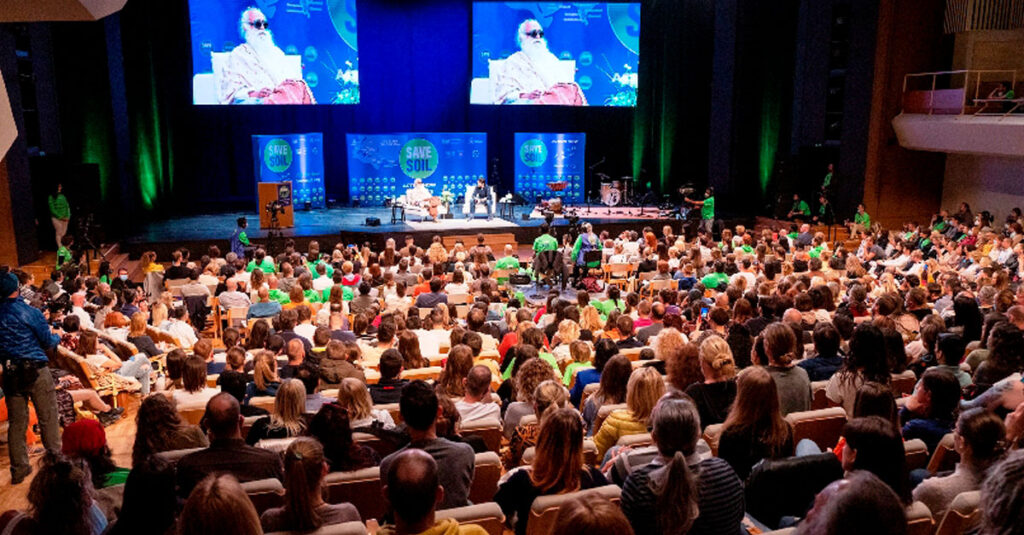
Excerpts:
Black & White: Why is a 60 plus old man embarking on a gruelling, lone and risky motorcycle journey of 30,000 kilometres, passing through 27 countries in 100 days – why are you risking your life in this ‘save soil’ mission? And, what drives you to do this?
Sadhguru: I am doing a lone motorcycle ride from London to southern India, covering 30,000 km and in 100 days. I am 65, and at this stage of my life, this is not a joyride. But I am doing this because as a generation, we have a challenge and a privilege that we could be that generation which turned back from the brink of a disaster. Or we could be that generation which slept through and fell over. So, this needs to happen now. During the journey, we have fixed up appointments with various heads of state, agriculture and environment ministers, influencers and well-known personalities. We have written to 730 political parties in the world to bring soil regeneration into their political agendas. The idea behind this motorcycle ride is just for this – if I fly into different countries, doors will not open. They have to see that I am staking my life a bit.
After each gruelling drive and perhaps, sleepless night, you still wake up with a smile on your lips and are raring to go again? How do you manage to still smile?
When you love someone, it is a privilege to do something for them. If you keep your heart barren, every activity will become burdensome. If you have love for life around you, everything that you do, how much ever you do, you always feel you have not done enough. Right now, a time has come, where there is a lot of talk about doing things for the planet. Some people think it is their mission; some are doing it because there is an impending disaster. But the best way to act for the wellbeing of the planet is to fall in love with all that is the very source of our life – the soil, the water, and every other life which is striving to keep us alive.
If we have loved our mothers, our children, and people around us, it is mainly because of their contributions and the sustenance they have offered to us which have made our lives. But for all this, the basis is the planet. It is Mother Earth’s involvement with our life, which makes our existence possible. How come most human beings did not develop a profound sense of love towards her? So if you have a profound sense of love, towards the life nourishing soil, water, air, and all the life around you, the impending disastrous situations could be easily prevented. It is most important that we do it with love in our hearts because otherwise, our actions and our commitments may not sustain. When you are in love, you are relentless action. That is what is needed right now. May you learn to love the mother of all mothers, Mother Earth.
What do you hope to achieve from this 100-day journey and what results would you like to see immediately and in the future, arising out of your enormous effort? After 100 days and after maybe a year or two or more, what do you want the people of the world to do to save soil? For, sustaining your efforts post mission is equally or more important, isn’t it?
The first thing that we want to change is the narrative in the world towards soil. We must recognise soil as a living entity, not a bunch of chemicals – which has been a predominant misconception. It is not about nitrogen or phosphorus – it is about living soil. Agricultural soil must have a minimum of three (3) to six (6) per cent organic content. Enshrining long-term soil health and biodiversity in national policies is important. Because without this, action will not be sustained. We may do something fancifully for a few days and retract again. The Conscious Planet – Save Soil movement is an effort to bring in a policy change. We have written to all the heads of state of 192 countries, and 730 political parties, to bring in a policy that a minimum of three to six percent organic content must be there in agricultural land.
In consultation with the top scientists in the world, we are preparing a soil policy document, which will have hundreds of ways in which we can regenerate soil in the world, depending on the latitudinal position, region, soil conditions, economic conditions, and also the agricultural traditions of the nation, because agricultural traditions cannot be changed overnight.
Many UN agencies have joined us. We have active partnerships with United Nations Convention to Combat Desertification (UNCCD), UN Environment Programme (UNEP), World Food Programme (WFP), and the UN’s Food and Agriculture Organization (FAO) scientists are also working with us. We are also setting up a group of 25 to 30 scientists who will handhold small countries for the next 24 months to see that soil regeneration can be embedded into their policy and also in action on the ground. Let us make it happen!
How much time do we have to save the soil, save this planet and save ourselves? What is the deadline? You had mentioned that in 30 to 40 years, the world would be in serious peril if we don’t save the soil from extinction?
The United Nations agencies, with enough scientific data, are saying that the planet has agricultural soil only for another eighty to hundred crops. That means we would run out of soil in 45 to 60 years. If that happens, there will be a serious food crisis on the planet – it is inevitable. What we are facing now is soil extinction.
A time has come where we need to address soil and take corrective measures now. If we start now, in 15 to 25 years, there will be a significant turnaround. But let us say we wait for another 25 to 50 years and then try to turn it around, they say it may take up to 200 years to turn it around. And that period is going to be disastrous for human beings as a species.
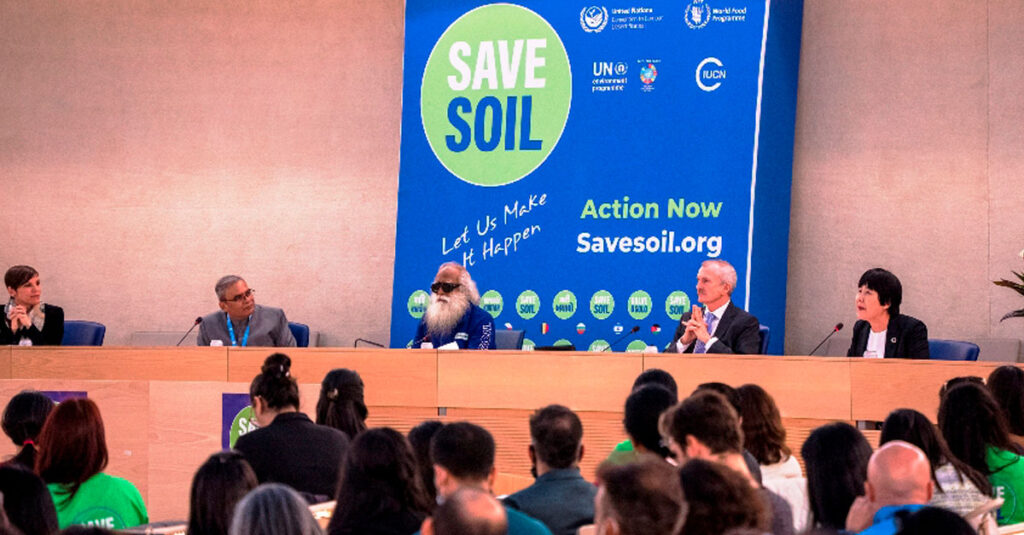
How many hours do you ride each day? Could you briefly describe the physical and other challenges that you have encountered so far on your path? How many hours of sleep do you get on an average in this 100 days’ mission?
Every day, I am riding nearly 500kms on average. Some roads have been very bad. My motorcycle is good for highways, but it is not built for rough kinds of roads – it is like bouncing around, literally getting my arms out of my shoulders. We also had heavy traffic, rain and little bit of snow. From Bucharest to Istanbul, it took eighteen hours – I started at 8am, and reached at 2am (the next morning). And there are a minimum of three to five events – media interviews, social media interviews, and meetings with influencers and parliamentarians. Even while I am riding I am doing these interviews. Every day is ending at 1.30–2am (in the morning). I do not know how the day goes by. It feels like ten minutes and the day is over. Everyone thinks, “Oh, he’s superhuman!” No, this is not about being superhuman. I want everybody to realise being human is super.
Sadhguru, the lay view is that people don’t really act until disaster strikes, like for example the pandemic, which clearly woke people up from their sleep and made them realise that most of the havoc was caused by them, because of their stark disinterest or lack of empathy to the many causes of the world. In the context of saving the soil, what will it take for the world to sit up and take notice; what will make the people get up from their slumber? Or, will we wake up too late?
We, as a generation of people, are facing a challenge; but at the same time, it is a privilege that we are in a cusp of time where we can pull ourselves back from a precipice. If we act now, in the next 10 to 15 years the global soil could be turned around significantly. But if we cross this threshold, it will become very difficult for future generations to live here.
Different nations may go for it at different intensities. Some will go all out; some will go slowly. But when the problem is so large, even incremental movement in that direction is good. If everyone stands up, it will happen very quickly.
Gandhiji said that the earth provides enough to satisfy everyone’s need, but not enough for man’s greed –in today’s age, isn’t his insight put to the test than ever before? It is said that the world is hitting global limits in its use of resources because of unprecedented population and economic growth…And we are feeling the shocks each day. Your comments.
The physical realm, however large it may seem to you, is a limited realm. Right now, our very economies are built like this: it is all about more, more and more. Every country is talking about growth rate. This means everyone has to buy more and use more. But where is that “more”? So people are thinking of harnessing some other planet. But destroying that planet is also just a question of time.
We are in this exploitative mode not by choice, but by compulsiveness. The only solution for this is consciousness. When humanity begins to operate out of consciousness, compulsiveness will not rule us, and we will do just what is needed, nothing more, and nothing less. Right now, we are behaving as if we are the last generation on the planet. We need to remind ourselves that we are just baton carriers, and we owe it to the next generation to hand over this planet at least as it was handed over to us, not in a destroyed, depleted condition.
You are passing through Oman and this is the first visit to the country. What do you have to say to the people of Oman specifically on the save soil drive and also generally?
The Middle East region has a unique terrain and ecology. It has become desert now, but the desert in Saudi Arabia, for example, was a rainforest over 10,000 years ago. That is how drastically the geography can change. In the last 25 years, desert lands in the world have expanded by 10 per cent. That is a serious challenge. But you have the advantage of being a smaller nation, so you can turn it around. The simple thing we are asking for is that agricultural lands must have at least three to six per cent organic content, whichever region it may be in. How you do it is left to you.
Slowly creating agricultural lands is important. It will take a lot of investment and much more work, unlike India or Europe where, with a little investment, the land will bounce back. There are simple methods with which we can extend the little vegetation in the land year-on-year. It must be a long-term policy that in 50 years’ time, at least one aspect of what you need – fruits, vegetables or something else – you must be growing by yourself. Because it is dangerous for any nation to completely depend on some other region for food. Food must grow in the place where people are, because geopolitics can change over a period of time.
Soil is the heart and soul of our planet and we cannot live without it – so to put it simply, saving our soil is ‘saving our soul(s)’…?
There are many issues in the world. But all other issues are like this: let us say you have five different health issues. You have a cardiologist looking at your heart, one specialist looking at your liver, another at your kidney, and so on. But to make all this work meaningful, the first thing is that you must keep the person alive. Only if the person is alive, all experts can work on various aspects. Right now, that is where we are. We need to understand that everything we know as life – worm, insect, tree, bird, animal or human beings – comes from soil. If we fix the soil, the water is fixed, air is fixed and everything is fixed. Soil must be rich and on because this body is the same sod. The greatest legacy we can leave for our children is an environment of rich soil and water. Only in preserving the quality of the soil, the quality of the planet and life will endure.
(*) According to Sadhguru, the word ‘Sadhguru’ is not a title, it is a description. It means, ‘uneducated guru’.

0 Comments